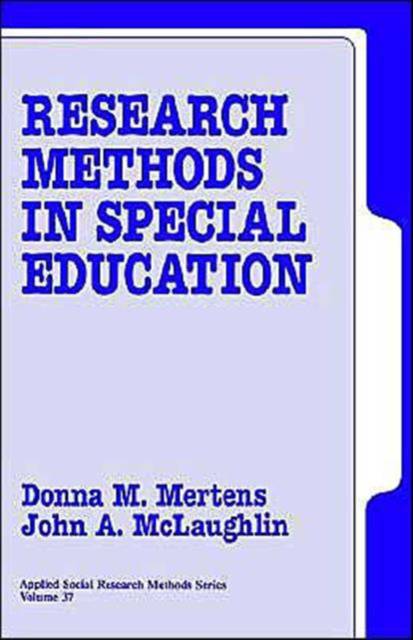
- Retrait gratuit dans votre magasin Club
- 7.000.000 titres dans notre catalogue
- Payer en toute sécurité
- Toujours un magasin près de chez vous
- Retrait gratuit dans votre magasin Club
- 7.000.0000 titres dans notre catalogue
- Payer en toute sécurité
- Toujours un magasin près de chez vous
Description
The format of each chapter is clear and logical. . . . The style is aimed at students and tries to engage them in thinking further about points raised in each chapter. The authors avoid over-use of technical terms. . . . Material is well-presented with many headings and subheadings. . . . This book is a useful source for cross referencing research reports in special education with design or techniques used. In addition, the checklists for critiques are potentially valuable as study aids for undergraduates and students commencing post-graduate work. --Ann Lewis in British Journal of Developmental Psychology "The book represents a useful short introductory guide to approaches to research. . . . the authors go systematically. . . through the stages of the research process from literature review to data analysis and reporting. . . . On completion of the book, the reader would have a very good idea of the span of options open to a researcher and would have gained considerable breadth. . . of knowledge not only about methodology, but also about the corpus of special education research. . . . Mertens and McLaughlin have. . . produced a sound introductory text which makes short cuts for the reader who is both new to research methodology and working within special education." --Educational Research "The breadth of reference is a strength of the text. . . . This short book is a convenient and well-organized addition to [the Sage series]." --Tony Cline in Division of Educational & Child Psychology Newsletter "Donna M. Mertens and John McLaughlin have created a basic work that beautifully bridges the fields of research and special education. The document provides a step-by-step approach with clear, rich examples that should allow the user to plan and conduct a research study that meets the standards of both fields. My initial fears were that the authors would get caught up in the jargon of either research or special education and present a confusing array of concepts that would benefit neither researchers nor special educators. Those fears were soon alleviated when they indicated that a ′researcher may be doing footwork that more resembles a "cha cha" than a straightforward stroll.′ The document is formatted in a manner that is easy to use with a map to each chapter at the beginning and study questions at the end. Mertens and McLaughlin have filled a unique gap in the research of special education issues." --Kenneth R. Olsen, Technical Assistance Specialist, University of Kentucky "This is a clear, sensitive, and user-friendly introduction to qualitative and quantitative research methods in special education. A much-needed primer and a must read for researchers working with individuals with disabilities." --David Fetterman, Director of Research and Evaluation,
Spécifications
Parties prenantes
- Auteur(s) :
- Editeur:
Contenu
- Nombre de pages :
- 144
- Langue:
- Anglais
- Collection :
- Tome:
- n° 37
Caractéristiques
- EAN:
- 9780803948099
- Date de parution :
- 29-09-94
- Format:
- Livre broché
- Format numérique:
- Trade paperback (VS)
- Dimensions :
- 146 mm x 216 mm
- Poids :
- 213 g

Les avis
Nous publions uniquement les avis qui respectent les conditions requises. Consultez nos conditions pour les avis.






